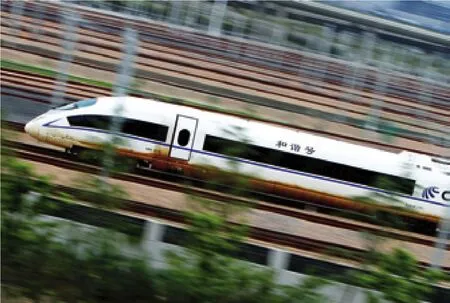Speeding Into a New Era
2010-10-14ByLILI
By LI LI
Speeding Into a New Era
By LI LI
China endeavors to increase its land transportation efficiency by building a much more complicated rail network
A 202-km high-speed railway linking two major Chinese cities was officially put into operation on October 19, the latest landmark in the country’s largest railway construction boom.
Two bullet trains equipped w ith China’s CRH380A system jumpstarted simultaneously at 9:00 a.m. on October 26 from Hongqiao Station in Shanghai and Hangzhou Station in Zhejiang Province, marking the inaugural run of the Shanghai-Hangzhou highspeed railway.
The new railway, w ith an operational speed of 350 km per hour, shortens the trip time between the two terminuses to 45 minutes from 78 m inutes.
During a trial run in September, the train on the new railway set a new speed record of 416.6 km per hour. Construction of the new line began in February 2009 and the track laying was completed this August.
Passengers on the super fast train between the two cities pay 156 yuan ($23.3)for a fi rst-class seat and 98 yuan ($14.6) for a second-class seat.
The new link in the Yangtze River Delta brings China’s total high-speed rails, w ith a speed of more than 200 km per hour, to 7,431 km, the longest in the world. More than 10,000 km are being constructed in China.
China is rapidly expanding and upgrading its railway network am id increased pressures on its transportation system. It launched its first high-speed line, which links the capital and the port city of Tianjin, during the Beijing Olympics in 2008. Since then, more lines have been put into service.
The highlight of China’s high-speed rail network w ill be the 1,318-km Beijing-Shanghai line. Currently under construction,the 220.9 billion yuan ($33 billion) line is scheduled to open in 2012. Once completed,train travel time between the country’s two most important cities w ill be cut in half to less than five hours.
According to the M inistry of Railways(MOR), China w ill have a rail network of 110,000 km by 2012, with 13,000-km highspeed rail form ing a national network w ith four east-west lines and four north-south lines. The network will reduce the travel time between provincial capital cities of neighboring provinces to less than two hours and the travel time between Beijing and most provincial capital cities to less than eight hours.
The Central Government’s blueprint on railway construction says China w ill have a rail network of more than 120,000 km by 2020.
Since construction began in 2004, 30,000 km of railways have been installed w ith a total investment of 2 trillion yuan ($298.5 billion) by the end of 2009. Investment sources have become diversified as less than 10 percent of the projects are funded solely by the Central Government and funding from local governments and non-government entities account for 30 percent of the total investment.
MOR announced in March that by 2020 China’s high-speed passenger rail network w ill reach more than 90 percent of the population by linking all the provincial capital cities and cities w ith more than 500,000 residents.
Jin Canrong, a professor at Renm in University of China, toldJiefang Dailyin January that building high-speed railways is particularly necessary for China, which has a huge population and limited land resources and needs to use technology to maximize the transportation efficiency of its rail network.
“The operation o f the Shanghai-Hangzhou high-speed rail line w ill help alleviate traffic pressure in the Yangtze River Delta region,” Liu Zhijun, M inister of Railways, said at the line’s inauguration ceremony.
“It w ill not only promote econom ic and personnel exchange but also facilitate the integration of the Yangtze River Delta region as well,” Liu said.
MOR forecasts indicate passengers are expected to make 3.05 billion trips in and out of the Yangtze River Delta in 2010, w ith the figure jumping to 5.5 billion in 2020.
Zhou Shaox iong, a p ro fesso r o f Hangzhou Normal University studying regional economic development, toldShanghai Securities Newsthe inauguration of the highspeed railway enables Hangzhou to enjoy the development synergy between major cities in the Yangtze River Delta. He said this also offers development opportunities to mediumsized and small cities along the new line.
Zhou said tourism and the entertainment industry will be the major sectors benefi ting from high-speed rail in Hangzhou, a city eager to establish itself as an international resort city by taking advantage of the fame of the World Expo in Shanghai.

DASHING AHEAD: A high-speed train departs from the Hongqiao Station in Shanghai on Oc tober 26, m arking the beg inning o f operations fo r the 202-km Shanghai-Hangzhou High-Speed Railw ay
